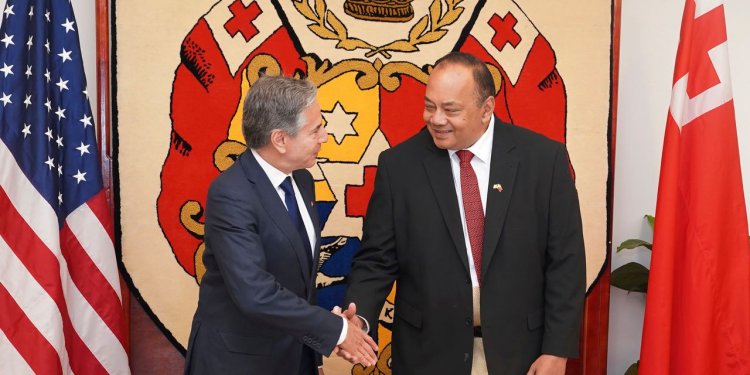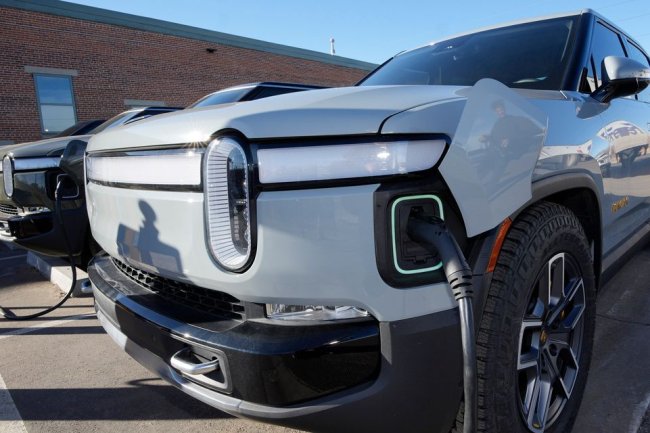U.S. Woos Pacific Nation Where China Has Stamped Its Mark
Secretary of State Antony Blinken’s visit to Tonga comes after the country was devastated by a volcanic eruption and tsunami Destroyed beach resorts on Tonga’s main island are seen in January of last year following a volcanic eruption. Photo: mary lyn fonua/Agence France-Presse/Getty Images By Vivian Salama July 25, 2023 7:52 pm ET NUKU’ALOFA, Tonga—When the Hunga Tonga-Hunga Ha’apai volcano erupted last year, bringing ruin to this tiny island in the South Pacific, the U.S. raced to send desperately needed humanitarian aid. So did China. The eruption was followed by a 50-foot tsunami that destroyed many of the homes on this archipelago located about 1,000 miles off the coast of New Zealand. Undersea cables were destroyed, limiting residents to only domestic phone calls. Diesel gas quickly


Destroyed beach resorts on Tonga’s main island are seen in January of last year following a volcanic eruption.
Photo: mary lyn fonua/Agence France-Presse/Getty Images
NUKU’ALOFA, Tonga—When the Hunga Tonga-Hunga Ha’apai volcano erupted last year, bringing ruin to this tiny island in the South Pacific, the U.S. raced to send desperately needed humanitarian aid. So did China.
The eruption was followed by a 50-foot tsunami that destroyed many of the homes on this archipelago located about 1,000 miles off the coast of New Zealand. Undersea cables were destroyed, limiting residents to only domestic phone calls. Diesel gas quickly became sparse and clean drinking water was almost impossible to find.
In the aftermath of the disaster, USAID provided $2.6 million in humanitarian assistance to support the people of Tonga, which U.S. officials said was indicative of Washington’s commitment to the strategically important Pacific islands. On Wednesday, Secretary of State Antony Blinken was the first American cabinet member to visit Tonga, where he dedicated the newly opened U.S. Embassy and held discussions with leaders in the South Pacific’s last Polynesian kingdom.
The U.S. has been seeking to bolster its outreach to the Pacific as a counter to China’s growing influence. Blinken has visited the Pacific islands three times in three years, and Wednesday’s visit will mark his 12th to the Indo-Pacific. Still, some Pacific leaders see the Biden administration playing catch-up after years of lackluster U.S. engagement that allowed China to gain sway in the region.

Secretary of State Antony Blinken with Tonga Prime Minister Siaosi Sovaleni on Wednesday.
Photo: Tupou Vaipulu/Press Pool
There is a growing sense of urgency in the U.S. that closer alliances need to be forged quickly, particularly after China struck a security pact with the nearby Solomon Islands last year.
Across Tonga’s main island, China’s footprint is clear, with many storefronts and commercial vehicles bearing Chinese language signs. The main government building, where Blinken held his press conference Wednesday alongside Tonga’s prime minister, was completed in 2015 by the Shanghai Construction Group under a Chinese grant of $11 million.
“We have no objection to the investments by or engagements by any other country, including China,” Blinken said. “If it’s done in a productive way, if it really is responsive to the needs of the people…that’s a good thing.”
After last year’s natural disaster, China deployed People’s Liberation Army planes and warships to deliver $100,000 in emergency assistance to Tonga, including drinking water and foodstuffs, and vowed to provide periodic assistance to address Tonga’s longer-term needs.

A development site for a Chinese investment bank in Tonga in 2019.
Photo: Mark Baker/Associated Press
China’s relief force included navy and air force battalions from the PLA’s Southern Theater Command, including Y-20 transport planes and two warships—a ship primarily deployed in amphibious landing missions but can also conduct humanitarian aid and civilian evacuation missions, and Type 901 fast combat support ship, which are designed to support carrier groups, highlighting the PLA’s interest in conducting nonmilitary operations.
A Chinese foreign ministry readout, citing Tonga’s Deputy Prime Minister Poasi Tei, said the Tongan government praised Beijing as “a true friend.”
Last year, the Biden administration invited the leaders of more than a dozen small island nations in the Pacific to Washington, hosting a two-day gathering to underscore U.S. commitment to the region now at the forefront of rivalry with China. While many of the islands are small in size and population, they stretch across a vast expanse of waterways strategic for commercial shipping, fisheries and security.
A senior U.S. official said Tonga, like the other Pacific nations, has a keen interest in deepening U.S. commitments on climate change, public health and infrastructure investments.
Access to some strategic islands could allow China to hem in Australia and impede U.S. forces from intervening in large numbers in attacks on Taiwan or allies such as the Philippines, security experts said.

President Biden hosted leaders of small island nations at a gathering in Washington last year.
Photo: JONATHAN ERNST/REUTERS
For that reason, America’s allies in the region also sense an urgency to bolster their influence across Oceania. Last October, defense ministers from nations in the South Pacific met in Tonga with an interest in forging closer military ties as an alternative to China. Tonga is one of only three Pacific island nations, including Papua New Guinea and Fiji, with a military. New Zealand, France, Australia and Chile also took part in the meetings.
Tonga has used its military in the past to contribute to international peace and security missions, including missions to Iraq and Afghanistan. This month, Tongan military forces are in Australia to participate in a biennial training exercise involving the U.S. and allies. The Nevada National Guard also entered into a State Partnership Program with Tonga in 2014. Now, the U.S. is hoping that Tonga can use its military for mutually beneficial missions closer to home.
“We want to be on the ground to improve the contacts, the lines of communication, the cultural ties with the people of Tonga; explore ways that we can deepen our cooperation,” a senior State Department official said. “Tonga is one of three countries in the Pacific that has a military and so that mil-mil cooperation has been important and will certainly continue and go forward.”
The official denied that the new American embassy in Tonga, officially opened in May, was geared at countering Chinese influence, but acknowledged that competition in the Pacific is a continuing reality. Some experts say Tonga could be a useful litmus test of whether the U.S. response is hitting the mark or falling short relative to China’s longer-term commitment.
Tonga has long asked the U.S. to set up consular services in the country to help facilitate visas for those wishing to visit, particularly since about 60% of Tongans belong to the Mormon Church and many have relatives living in the U.S.
“If the United States is to engage the region seriously, it needs to get the basics right, starting with having embassies in more countries,” said Brian Harding, a senior expert at the U.S. Institute of Peace. “Progress on this front is what Blinken is highlighting on the trip.”
Blinken was set to travel to New Zealand and Australia following his stop in Tonga. In Wellington, New Zealand, he will hold meetings with the country’s leadership before watching the U.S. women’s soccer team take on the Netherlands in the World Cup.
In Brisbane, Australia, he is expected to join Secretary of Defense Lloyd Austin, Australian Deputy Prime Minister and Minister for Defense Richard Marles, and Australian Foreign Minister Penny Wong for the annual Australia-U.S. Ministerial Consultations, known as Ausmin.
The U.S., Australia and the U.K. formed a pact in 2021, known as Aukus, to boost the three nations’ collective deterrence in the Indo-Pacific.
Write to Vivian Salama at [email protected]
What's Your Reaction?













